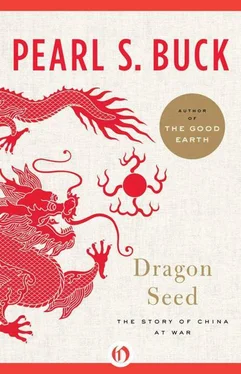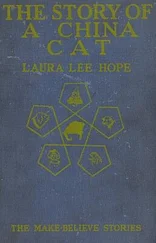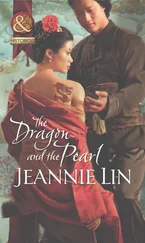… Under the matting roof which he always put over his courtyard in summer Ling Tan was listening to a stranger. He was a peddler of Shantung silks and grass cloth, one of those men who make their living by travelling south with their goods in spring and selling them to Southerners and then carrying back with them in early summer the thin silks of the South such as are not woven in the North. He had now from the North only a few pieces of grass cloth so coarse that he knew none but a farmer’s wife would buy them and so he had left the city to go out among the villages. Thus he had come to this house because it was bigger than most farmhouses and because he saw at the gate a pretty young woman idling.
She seemed unwatched but she was not, for the moment he came up to her and spoke, the mother, Ling Sao, came out from behind the gate and said to him sharply:
“If you must speak to a woman, speak to me and not to my second son’s wife.”
“I was only going to ask her where her man’s mother was,” the peddler said hastily. He perceived in one glance of his eyes that this elderly woman was a strong managing mother, and the head of her house. “I am on my way north to my home,” he said, “and I have left only a few feet of good grass cloth for summer wear and they told me in the village that you were the most discerning woman in these parts—”
“Put out your cloth and put in your tongue,” the wife said.
He hastened to obey her, though he laughed politely when she said this, and in a few minutes they were quarreling heartily over the price of the grass cloth.
“I have put the price at a gift,” he argued at last, “because there is to be war this summer in the North.”
The cloth fell from her hand.
“What war now?” she asked.
“No war of ours,” the man replied. “It is the little dwarfs from the East Ocean, who always like to fight.”
“Will they come here?” she asked.
“Who knows?” he replied.
It was then that she went to the door and called for her husband to come.
Now Ling Tan listened to the peddler as they sat at the table under the matting roof of the court. Under his feet the stones were cool. It was a pleasant court, warm with sun in the winter and in the summer cool. An ancestor of his had sunk a small pool in its center and had planted a lotus in a jar. This lotus now bloomed with six flowers, deep red in the center where the yellow hearts were. The table was set here in the summer and here they ate even when it rained, for the matting held off the water. At the table he sat with the peddler while his wife poured them tea and then took her seat on a bench a little to one side. She was making shoes. The sole was thick but she had a long iron needle. When it held fast in the cloth she seized it in her strong white teeth and jerked it through and pulled the hempen thread after it. Ling Tan always turned his eyes away when he saw this for it set his own teeth on edge, though, because he did not know why, he had never told her so.
“You say the East-Ocean dwarfs have killed some of our people?” he now asked the peddler.
“In the North they have killed men, women and children,” the peddler said.
He lifted his bowl and drank the tea and stood up. “I must reach Pengpu tomorrow and so I part from you,” he said. He was a common looking fellow as peddlers are, his talk worn smooth with much use in many places.
Ling Tan did not stir. “What is the outlook?” he murmured to himself.
But since he asked no one, no one answered him. The peddler shouldered his pack and bowed and went away, and Ling Tan was left alone with his wife in the court. She went on sewing and he sat there looking around at his house. The walls were of ancient brick and the roofs were low and tiled. Inside the house the partitions were of brick laid single between beams of wood and first plastered with earth and then washed white with lime. Here his ancestors had lived and died and he had been born, the only son of his parents, and here his three sons lived and his grandson.
The afternoon was still and hot. The hearts of the lotus flowers quivered. In the silence he heard his grandson cry. Ling Sao rose and went into the house and he sat alone. He had a good life, he thought. He was lucky that his share of the earth was near a great city, near the big river, in a valley set under hills from which the water ran down even in dry weather. There was nothing that he desired that he did not have. He was neither rich nor poor. In his house his only dead child was a girl. He himself had never been ill. At fifty-six his body was thin and strong as it had been in his youth. He could beget sons as well as ever if it had not been that his wife was past it. An old woman in the village teased him often to buy a concubine through her but he would not.
“I have my sons,” he had told the greedy old woman only yesterday.
“A man cannot have too many sons in these times,” she had said. “What with wars and guns and all these foreign things, who can have sons enough?”
But he had only laughed. Except that she bore no child, his woman was as good as ever and better because she knew him to the core of his being. He was satisfied and he had no wish to begin over again with a young girl. Besides, peace flew out of the house when a second woman walked into the door.
He struck the table with his hand, swallowed the tea that was left in his bowl and stood up and tightened the strip of blue cloth that was the girdle about his waist.
“I go back to my work!” he shouted. No one answered him, but he expected no answer, since they were only women who heard him, and he went his way.
In the field he was pleased to see how near his sons were to the end at which he had been working. Another good hour and by sunset the field would be done. This was the last field and with it all his rice would be planted and his family fed for another year. He bent his back again and saw his own face dimly in the brown water, a thin face square at the cheeks and the jaws. He could always keep his hat on easily because the string caught firmly under his square chin. There were men in the village who had to hold a hat string between their teeth because their chins were slopes. But he was not one of them. And he could close his mouth over his teeth decently and need not always be agape as his third cousin was, who was nevertheless a good man and even a little learned, with sense enough to read the meaning out of the magistrate’s proclamations on the city wall.
Ling Tan himself could not read a word. He had never needed to read. Sooner or later, he always said, a man heard everything. If it were good news he heard it quickly, and the more slowly he heard bad news the better. He had not sent his sons to school, either, and for this he had not yet been sorry, no, not even when from the schools in the city the young men and women students came into the villages to preach that today every man and woman should read and write. Looking at those pale students, he still thought to himself that he saw no reason to believe what they said. He had his own ways and he kept them.
Now in the field he did not speak to his sons nor they to him until the work was done and they met at the last seedling thrust down. Then they straightened themselves, the three of them, and pushed their hats off their heads to hang down their backs.
“What did our mother want?” Lao Ta asked.
“There was a peddler from the North and he brought news of a war,” the father said. It had been an hour since he had thought of the matter and by now it seemed of no importance to him. The North was far from here. He measured with his sharp eye the lines of the seedlings, green against the brown water. The shadows they cast made a straight black line. His sons’ right hands were as steady as his own. He wiped his face with the end of his girdle and said to his second son:
Читать дальше












